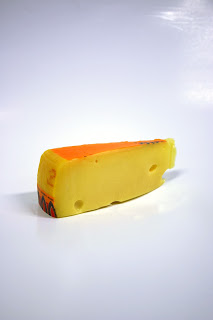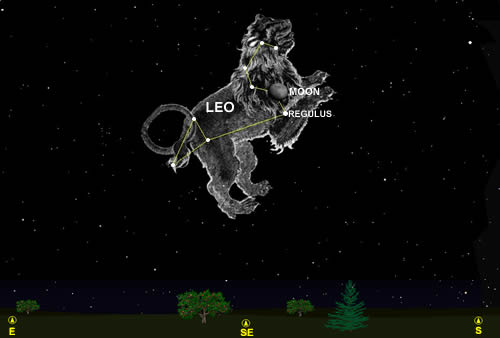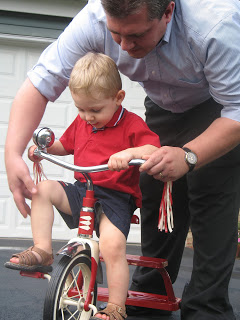
I hit a parenting low point the other day. I drove a piece of cheese to my son’s middle school. Just the cheese and I, buckled in safely, driving together across town to attend my son’s French 8 Mardi Gras party. I wasn’t invited, just the cheese.
The cheese was my cross to bear after being interviewed recently for a parenting magazine about when it is okay to rescue our kids, and deliver the cheese when they forget it, and when it’s not okay. I’d shared with the magazine writer that I’m coaching my kids to be courageous in life primarily through encouraging an
internal locus of control. For example, I discuss with my kids at the beginning of each year what their responsibilities are and what mine are. I also offer one free rescue per year. This year both my kids used their freebie in the first few weeks of school. I was able to do them that favor. Heck, I was even happy to help. But I was clear that I would not be doing it again. Since then, I’ve received no calls from my daughter and three more phone calls from my son begging me, in a pleading tone coupled with long awkward pauses. “I don’t have any lunch money!” “I forgot to get you to sign my assignment, I’m gonna’ lose 15 points if you don’t sign my assignment today.” “I need my rowing gear.” I problem-solved with him by phone and got him to identify a few possible solutions, but I didn’t rescue him.
I know, I sound hard-core right? Well, that’s the thing about coaching courageous kids who have a belief and expectancy that they are the masters of their own destiny, as their parent you sometimes have to be hard-core.
Why won’t I rescue my kids? Emergencies are one thing, but delivering cheese is quite another. Basically, I want them to believe and act as if what happens to them in life is to a great degree within their control. I want them to learn to rescue themselves. Yes, random acts of violence do happen, disasters strike, devastating diagnoses are received. But psychology and social learning research is clear, we are healthier, more powerful, confident, and resilient when we develop an internal locus of control and take responsibility for the circumstances and choices that shape our lives. This requires courage!
Here’s the thing, none of us is all internal or external in our locus of control. Everyone forgets things occasionally. Everyone needs to cut themselves some slack once in awhile. No one deserves a terrible tragedy befalling them. But, if we protect our children from experiencing the consequences of their choices and actions, even their memory lapses, we are reinforcing as fact that they are not the masters of their destiny.
As I’ve written previously, the good news is that we have a lot of influence as parents in helping our child develop a secure, self-motivating, self-discipline-inducing internal locus of control. The bad news, it’s hard to do! Here’s my advice: set-out the family rules clearly, encourage self-discipline and responsibility-taking, build in some room for exceptional exceptions, and be consistent.
So why did I make an exception for the cheese you ask? I accepted responsibility for disregarding the reminder email from his classroom teacher, so it make me weak-willed to decline his request when he called from the bus that morning. The school staff was kind when I delivered the cheese. I tried to hold my head high. When I asked if this kind of thing happens often, they said “Too often! Usually it’s the same kids, and their parents send in granny, auntie, and friend reinforcements when they can’t rescue their kid.”
What happened to the cheese? Well, after we bid our goodbyes, my son heard over the school-wide P.A. system, “Could the person who just took the cheese from the main office please return it? It’s not your cheese!” “Oh, My God!” my son responded in his science class, “That’s MY cheese. Someone took my cheese!” His teacher, needless to say, thought the scenario totally ridiculous, burst out laughing, and allowed my boy to go get his cheese all on his own.
I personally respect and love my kids’ teachers because they rarely email me, but instead choose to empower my ‘tween and teen kids with their own school responsibilities. I think it takes courage for teachers to take on the complaining parent who still expects that our children be spoon-fed. It was up to us to spoon-feed our infant and to teach him/her to independently use a spoon. Teachers work hard enough, asking them to also overfunction as our child’s parent, is just too much to ask.
When my son was heading to bed, I asked him if he understood why I had decided to rescue him and bring him the cheese. “’Cause it was a nice thing to do? It made you feel like a good mom?” “Sweet of you to say, but no. I did it because I owned 100% of my part of the problem. I disregarded the email from your teacher. I did not feel in integrity though today and want to make sure it doesn’t happen again. I would strongly suggest that you use your school planner more.” I also asked him, “Do you know what I mean when I say ‘being out of integrity’?” “Yeah, Mom. You are out of integrity when you have to say something to me twice.” Busted!
If we make a family rule, explain it clearly to our kids, ask if there are any questions (e.g. “Do you understand this rule?” “Do you understand what’s expected of you?”), and make an agreement as a family to follow through, we shouldn’t need to remind or reprimand. If we do, we are reinforcing an external locus of control in ourselves and our children. We are, in essence saying “My word doesn’t mean much. You and I aren’t capable of following our own rules; we need help from outside sources.” We then nurture dependence not courage in our kids, and will find ourselves driving a piece of cheese to school.
 I hit a parenting low point the other day. I drove a piece of cheese to my son’s middle school. Just the cheese and I, buckled in safely, driving together across town to attend my son’s French 8 Mardi Gras party. I wasn’t invited, just the cheese.
I hit a parenting low point the other day. I drove a piece of cheese to my son’s middle school. Just the cheese and I, buckled in safely, driving together across town to attend my son’s French 8 Mardi Gras party. I wasn’t invited, just the cheese. 


